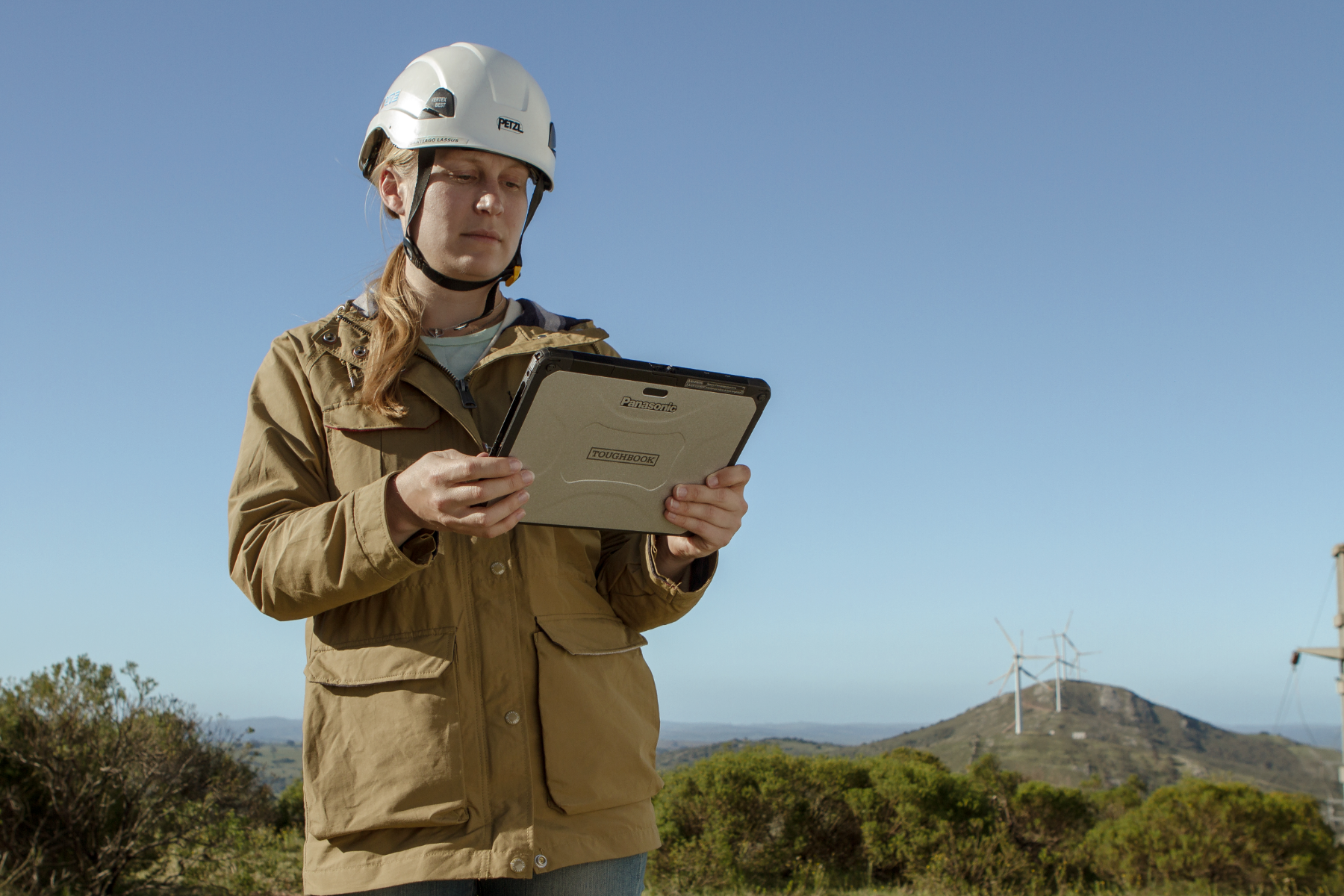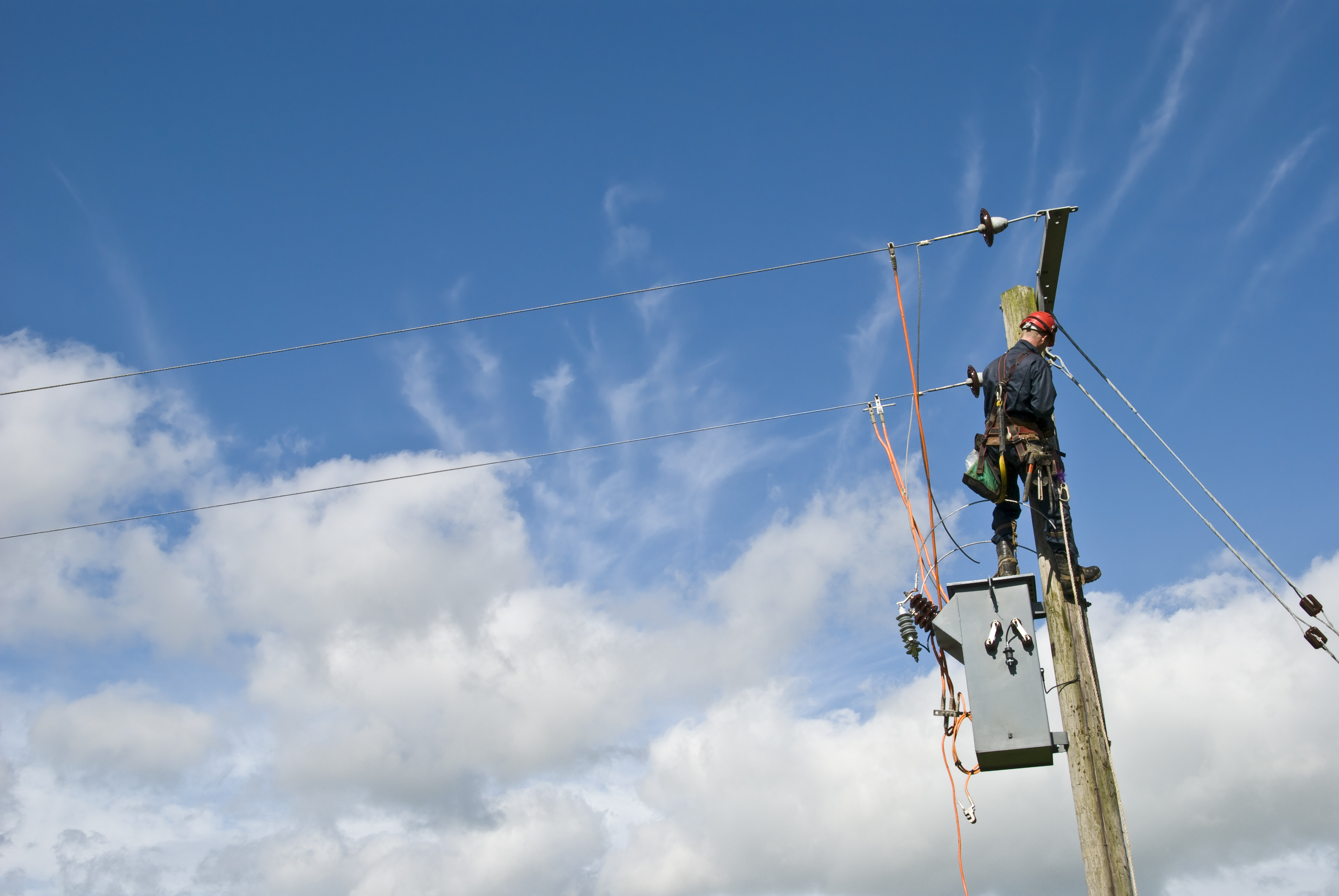The Rugged Tools Every Field Service Technician Needs
Utilities and renewable energy companies are on the front lines of the energy transition. They must build, connect, and operate new energy sources while also maintaining the existing grid infrastructure. At the same time, extreme weather risks are on the rise, from record heat to more frequent storms. These challenges are putting pressure on the equipment and staff working hard to ensure grid reliability. For a field service technician facing these conditions, a rugged laptop or mobile device is crucial to success in their day-to-day jobs.
It’s not only field conditions that technicians have to think about, however. Their digital tools must be able to seamlessly move between the field and the office while providing state-of-the-art cybersecurity at all times. Maintenance staff are also facing labor shortages, and digital transformation is changing how utilities function. All of these factors mean the right technology is more important than ever for utility staff and renewable energy technicians.
Fortunately, rugged modular laptops can meet the numerous challenges every field service technician must address. With a wide range of benefits, TOUGHBOOK® just makes sense for utility and renewable energy technicians and staff in the field.
A reliable rugged laptop provides connectivity anytime, anywhere
Field service technicians are, by definition, working away from an office and are frequently sent to remote locations. They could be repairing power lines or transformers, cutting trees and vegetation in wooded areas, or locating buried infrastructure. As a result, connectivity can be a challenge, and they need rugged devices that can send emails, files, and reporting data back to their home office, even when they’re in more rural areas.
Accessing cloud-based geographic information systems (GIS) is particularly important. This location data helps field staff find substations, electrical poles, and other infrastructure needing repairs. GIS data also allows technicians to map distances and keep track of vegetation spans requiring trimming. Utility field service technicians need reliable access to this data, which requires mobile devices that can maintain connectivity even while traveling.
When storms hit, field technicians have the vital task of repairing power lines, sometimes in dangerous conditions. With electricity and telecommunications often knocked out, staying connected in these situations is crucial to locate infrastructure for repairs, estimate outage time, and stay in contact with team members. Not only does this connectivity help get the job done in disaster zones, it also keeps technicians safe.
This is why a field service technician needs rugged technology such as our TOUGHBOOK G2. This 2-in-1 tablet solution is Wi-Fi-enabled and has cellular options including 4G LTE and 5G with Sub-6 and mmWave (EM9190). Rugged laptops like the TOUGHBOOK 55 feature pass-through antennae to ensure they maintain a connection even in those remote locations or harsh conditions. With rugged technology options, field technicians have the reliable connectivity they need.
The modular solutions every field service technician needs
For utility technicians, juggling multiple pieces of equipment is a non-starter. No tech wants to be up in a tree or pole trying to switch between devices to access specific capabilities. Rugged technology that can handle multiple tasks and move seamlessly between different functions is a must. That’s why we offer a range of xPAK customizations for our various models. These options keep your TOUGHBOOK running for extended periods and allow technicians to complete numerous tasks with just one device.
Customizations available on TOUGHBOOK devices include:
- Serial ports for plugging in diagnostic equipment
- Fingerprint reader
- USB-A ports
- HDMI
- Blu-Ray, and DVD drives
- Hot-swappable batteries
Not only do TOUGHBOOK computers support a variety of functions in the field, they also facilitate communications between technicians and their offices. Rugged mobile solutions can help you manage log-keeping and data collection, and they automatically send critical information to office-based teams.
Rather than writing down information and shuffling paperwork between trucks and the office, rugged laptops and tablets transmit data on repairs, locations, equipment, and more so teams are always informed without having to duplicate data entry efforts.
Smarter devices handle the smart grid
The energy transition is driving fundamental changes to power grids. As a result, utility technicians are gathering more data than ever from smart meters and distributed energy resources (DERs).
This means that rugged mobile devices must also have substantial computing power on top of their ability to handle outdoor conditions. Renewable energy technicians, for example, conduct repairs in sunbaked fields of solar panels and atop massive wind turbines, and utility technicians are working on connecting these assets to grid infrastructure. Data is moving between more assets, and the distances between those assets are growing — all of which requires powerful hardware and software.
We designed TOUGHBOOK computers precisely for these conditions, which is why the TOUGHBOOK G2 tablet has high-end CPUs and GPUs to handle more data. MIL-STD and IP-certified rugged devices are also capable of handling the conditions field technicians face when building tomorrow’s smart grids.
Utilities and renewable energy providers need strong cybersecurity
Computing power is one thing, but technicians also need cutting-edge security to manage smart grid infrastructure. More interconnected digital resources means more opportunities for hackers and malicious actors to damage critical infrastructure. To stay one step ahead, a field service technician needs rugged devices that are secure by design.
Changing regulations are adding urgency to this issue too. For instance, NERC CIP-003-9 is a regulation that requires low-impact bulk electric system cyber systems to have enhanced security measures in place. Utilities and renewable energy providers will need the ability to control and cut off remote access, for example. TOUGHBOOK solutions give utilities devices with built-in security measures that protect the hardware and software, including:
- Multi-factor authentication with biometrics like a fingerprint reader
- Trusted Platform Modules (TPMs) to safely store passwords, certificates, and encryption keys
- Drive- and hardware-based encryption
- Asset-tracking software such as AbsoluteⓇ PersistenceTM
Investing in secure devices enables utilities to protect their grids and stay ahead of threats.
Rugged modular devices improve fleet management
Of course, cybersecurity measures aren’t the only things that become outdated. Paper-based work orders should also be retired and replaced by mobile technology that improves utility fleet efficiency. For linemen, dispatchers, and fleet managers, reliable communications are vital for completing many daily tasks.
GPS built into mobile devices, for example, helps office teams and leadership know where their vehicles and crews are located. Drivers and field technicians don’t have to rely on maintaining a cell signal when using rugged mobile devices, and office teams can communicate route optimizations and schedules quickly and easily via mobile technology. Knowing fleet vehicle locations also allows dispatchers to deploy the nearest vehicle to an incident.
All these capabilities improve productivity for fleets. They result in lower fuel costs as fleets use the most efficient routes, and they enhance worker safety as office crews can keep field staff informed of dangerous road conditions.
Rugged technology also allows field crews to get more done while they’re on the road. With vehicle docks and hot-swappable batteries, TOUGHBOOK computers keep working in the field and communicate more information for longer periods of time than other types of devices. Even in disaster zones or dangerous conditions, TOUGHBOOK computers maintain communications so road crews have immediate information to adjust routes on the fly, keeping office teams and customers aware of repairs, conditions, and equipment status.
Every field service technician can reduce waste with the right technology
Fleet data and route optimization don’t just lower fuel costs, they also lower fleet emissions. Reducing fuel consumption and making fleets more sustainable are key steps to reducing utilities’ overall environmental impacts.
Another sustainability benefit: TOUGHBOOK rugged laptops last for years, even in harsh conditions, which means utilities can reduce waste and material consumption. Devices such as the TOUGHBOOK G2 2-in1 laptop have MIL-STD-810G certification for environmental resilience and IP65 certification for water resistance. All TOUGHBOOK computers are MIL-Spec rated for drops, so every model can withstand the demanding conditions field technicians face.
This longevity means fewer devices needed, which means less plastic, batteries, and metals. TOUGHBOOK’s modular design also contributes to their sustainability. Rather than providing multiple devices for each employee, field technicians need only one device to handle all their tasks.
When a TOUGHBOOK reaches the end of its useful life, we offer a recycling program to responsibly dispose of and reuse the materials. These features make TOUGHBOOK the more sustainable choice for utilities and renewable energy providers seeking to improve their ESG scores and reduce their environmental impacts.
Rugged technology drives greater employee efficiency
Conserving resources goes beyond materials. Utilities must also conserve their crews’ valuable time and gain efficiencies wherever possible.
For a field technician, a modular device that can handle numerous tasks makes their job easier. With rugged technology, utility crews can access location data for all types of infrastructure, from individual utility poles to water mains. Navigating a heavily forested area to identify the span of vegetation that needs trimming is much faster with a rugged mobile device that stays connected to GIS data.
It’s also much simpler for a field service technician to tap a few notes or even dictate information directly to their device rather than fumble with paperwork and written reports amid field operations. With microphones and helpful xPak customizations, TOUGHBOOK devices simplify these critical tasks and facilitate the shift from paper-based systems.
These rugged tools help short-staffed utilities to improve each worker’s productivity, and they make day-to-day tasks easier for employees. For utilities looking to do more with less, technology is a crucial way to improve efficiency and equip field staff with the tools they need to manage their workload effectively.
Technology supports recruiting the next generation of field service technicians
As utility companies seek to attract new workers, the employee experience is an important selling point. Linemen and field technicians are retiring in greater numbers, while at the same time aging infrastructure and DERs require more construction and maintenance. Utilities that can offer work technology that mirrors consumer technology can better recruit the younger generation, which sees mobile technology as table stakes.
The ability of rugged technology to streamline operations and improve employees’ workloads and safety are also key differentiators in the competition for talent. Greater sustainability with technology such as TOUGHBOOK is also valuable for younger employees. Studies have shown that younger applicants will actually turn down job offers if a company’s ESG ratings are poor.
Better employee experience, safety, and environmental impacts are all driven by having the right rugged technology, and utilities can help position themselves as an employer of choice by providing TOUGHBOOK rugged laptops.
Rugged laptops and devices lower the total cost of ownership
Not only do TOUGHBOOK computers help with workforce development, but they also benefit the bottom line. With a long lifespan, improved employee productivity, and fleet optimization, their total cost of ownership (TCO) is a major savings for utilities and renewable energy providers.
TOUGHBOOK laptops and 2-in-1s need fewer repairs and replacements than other rugged technologies, so utilities spend less on devices overall. In fact, TOUGHBOOK rugged devices are 72% more reliable than other rugged options on the market, based on failure rates. This means better uptime and more productivity for workers, and lower equipment costs for utilities.
The direct savings are significant, but Panasonic’s rugged devices also provide secondary savings. With service records and vehicle performance data streamlined and easily available, fleet managers can take a proactive approach to vehicle maintenance. Instead of addressing vehicle problems when they’ve already taken a truck out of service, utilities can make repairs before problems start or when a component is just starting to show signs of wear and tear. Staying ahead of repairs saves money and also reduces vehicle downtime so field crews can focus on service.
Connectivity and communications with rugged technology improve worker safety, and accurate log-keeping and reporting make it easier to maintain regulatory compliance. Being able to document and report on regulatory requirements quickly reduces the chance of fines or fees, and mobile technology facilitates reporting for employees.
All of these measures save on long-term costs and liabilities, and they set utilities up for better profitability not just now, but into the future.
The value of modular rugged solutions
Utility field operations benefit from rugged mobile technology in numerous ways. From safety to efficiency to sustainability, rugged technology puts the best solutions available into the hands of the field technicians who are making the energy transition a reality.
For technicians trimming vegetation before it causes an outage, working with a mobile device that stays connected and avoids the need for paper-based work orders is a huge efficiency improvement. Better cybersecurity with TOUGHBOOK is a must for utilities looking to meet new regulations and prevent hacks or breaches of their network. Saving money with efficient fleet operations and lower technology costs is vital in a time of razor-thin margins. Improving employee productivity and safety is a long-term investment from which all utilities benefit. And these are just a few of the improvements rugged technology provides.
With Panasonic TOUGHBOOK solutions, utilities and renewable energy companies are ready to build and maintain 21st-century grids — and a 21st-century workforce. Field service technicians are crucial to utilities’ ongoing profitability and success, and with the right mobile tools, they can achieve even more in today’s changing world.
Learn more about what TOUGHBOOK can do for utilities.
![]()



